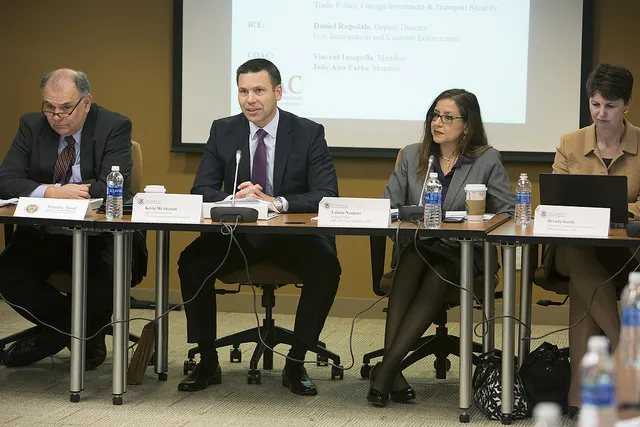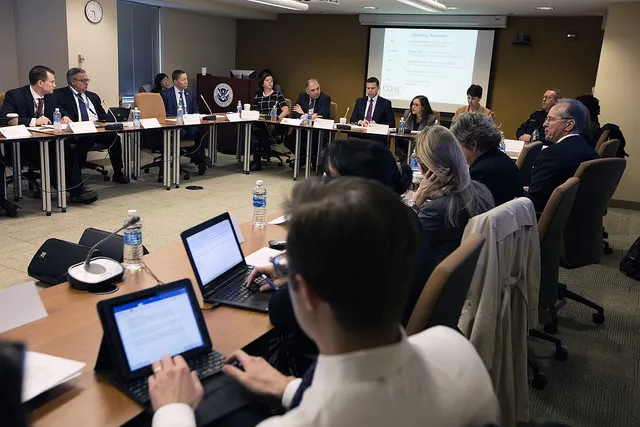
McAleenan (center) speaks to attendees
at the first 2017 public gathering of
COAC held on March 1, while, (l-r) Deputy
Assistant Treasury Secretary Timothy Skud,
Acting Director of CBP’s Office of Trade
Relations Valarie Neuhart, and Executive
Assistant Commissioner of CBP’s Office of
Trade Brenda Smith listen. Photo Credit:
Donna Burton
Members of the Commercial Customs Operations Advisory Committee, known as COAC, met in Washington, D.C., March 1, for their first meeting in 2017. “Since we last met, we’ve seen a transition in our government and welcomed a new administration including a new secretary for the Department of Homeland Security, General John Kelly,” said Acting Commissioner of U.S. Customs and Border Protection Kevin K. McAleenan, who addressed the group for the first time in his new role.
McAleenan emphasized that CBP has stayed focused on its priorities including working closely with the COAC. “We’re going to be working not just on trade enforcement, but continuing our efforts to coordinate with you on facilitating legitimate trade and pressing forward on our shared priorities such as automation and completing the implementation of ACE,” the Automated Commercial Environment, CBP’s cargo processing system.
To date, CBP has completed six of the seven core processes in ACE. “One hundred percent of import manifest, cargo release reporting, and export processing functionality has been deployed,” said McAleenan, noting that more than 85 percent of post release capabilities for goods that have entered the U.S. commerce are now available in ACE. “None of that would have happened without the work of this COAC, its predecessor, the subcommittees, and the number of leaders in this room. It has been an incredible partnership.” CBP continues to aggressively pursue the integration and testing needed for the final primary deployment in ACE, previously postponed in consideration of stakeholder feedback and the complexity of ongoing testing.
The meeting included updates on trade programs and COAC subcommittee work. Committee members presented 52 recommendations, unanimously passed by the COAC — 35 of which pertained to trade modernization, while the remaining 17 focused on exports. Recommendation topic areas ranged from international engagements to the growing field of e-commerce.
COAC member, Cindy Allen, the vice president of regulatory affairs and compliance for FedEx Trade Networks, spoke on e-commerce. “E-commerce is changing the way the supply chain works from start to finish. It’s driven by different people. We aren’t necessarily dealing with a big box retailer or a company. It may be someone who is starting a business out of a garage or out of his or her dining room. So it’s challenging to understand how it’s impacting trade,” said Allen, adding that her workgroup thought that more education on e-commerce was essential.

established by Congress, is comprised of
20 appointed members from the
international trade community. On
Wednesday members convened in
Washington, D.C. Photo Credit: Donna
Burton
“Mapping out how the new supply chain looks now and how it will look in the future is going to be critical,” she said. Furthermore, Allen explained that it’s important to define what e-commerce is. “A lot of individuals equate e-commerce with the courier industry. We may facilitate e-commerce as a courier; however, it’s being driven by different entities. So there are new facets to the supply chain that we’re going to be looking at.”
Adding to the discussion from an intellectual property rights perspective, Michael Walsh, director of the IPR and E-Commerce Division in CBP’s Office of Trade, explained that CBP has identified a connection between IPR infringements and the movement of goods through e-commerce channels. “It points to the darker side of e-commerce,” said Walsh, who noted that CBP made 31,560 IPR seizures during fiscal year 2016. “The vast majority were small packages that were directly shipped to individuals. It’s a trend that has been changing over time,” said Walsh. “In the past, most of our IPR seizures were larger shipments.” As a consequence, Walsh said, “We’re looking toward having continued conversation about e-commerce and more specifically how CBP can make sure that its IPR program is as robust as possible.”
COAC is a 20-member advisory committee established by Congress in 1987. The committee provides advice and recommendations to CBP and the Department of the Treasury on the commercial operations of CBP and trade-related interdepartmental functions. Some of the issues that COAC focuses on include enhanced border and supply chain security, international efforts to harmonize customs practices and procedures, import safety, compliance, and modernization and automation processes used to facilitate trade.
The next COAC meeting is scheduled to be held in Washington, D.C. on May 3, 2017.

